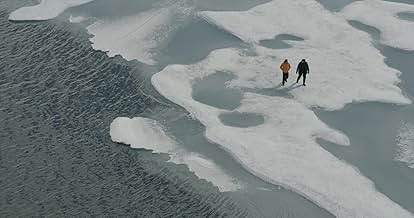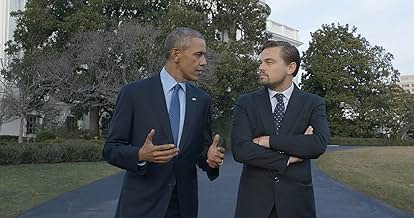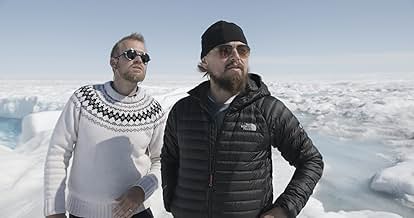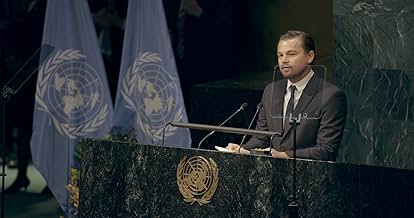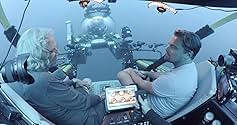Ein Blick auf die Auswirkungen des Klimawandels auf unsere Umwelt und was die Gesellschaft tun kann, um das Verschwinden von vom Aussterben bedrohten Tierarten, Ökosystemen und indigenen Gem... Alles lesenEin Blick auf die Auswirkungen des Klimawandels auf unsere Umwelt und was die Gesellschaft tun kann, um das Verschwinden von vom Aussterben bedrohten Tierarten, Ökosystemen und indigenen Gemeinden auf der ganzen Welt zu verhindern.Ein Blick auf die Auswirkungen des Klimawandels auf unsere Umwelt und was die Gesellschaft tun kann, um das Verschwinden von vom Aussterben bedrohten Tierarten, Ökosystemen und indigenen Gemeinden auf der ganzen Welt zu verhindern.
- Regie
- Drehbuch
- Hauptbesetzung
- Auszeichnungen
- 2 Gewinne & 8 Nominierungen insgesamt
- Self
- (as Ban Ki-Moon)
- Self
- (as Michael Brune)
- Self
- (as Dr. Enric Sala)
- Self
- (as Dr. Michael E. Mann)
- Self
- (as H.E. Tommy E. Remengesau Jr.)
Empfohlene Bewertungen
This was probably the goal of the producers (among them Leonardo Di Caprio or Michael Scorsese) to appeal to a general audience. I must admit I watched it also for that reason. And I see no problem with that! I spare my comment on Leo Di Caprio's activism and work in that field for later as I know many argue that his activism is only his PR and so on...
But, I think the point here is the message of this movie, not the messenger. Visually it is excellent. Leo Di Caprio and all the crew takes us on all the places directly affected by the climate change and show us how the poorest countries on Earth suffer the most of the effects of climate change. They interview not only politicians, leaders and, the pope - but mostly scientists and local people from the most damaged areas. They connect how the oil industry and current energy giants like Exxon, Tepco and so on. lobby in US congress to buy their support and tacit consent, but not dwell too much on it - as if to shift the focus to nature with its stunning cinematography and rather appeal to people on that level, while showing how climate change already f*cked up Poles, forests, and coastal areas and how it's gonna f*ck up a many more areas and shape the politics and economy of the near future.
I also liked that despite his celebrity status Leo Di Caprio (the main interviewer) doesn't fall into false hopes and promises but keeps his mind open and skeptic. Because I think the goal of the movie is to show the reality of the long-term effect and not to wallow too much in short-term steps - like Paris 2015 conference.
Lastly, about Leo Di Caprio. You don't need to like him to enjoy this movie. And you can say whatever you want about his activism, the fact is that on the top of making this documentary, he drives an electric car, and a bike, uses his Facebook almost solely on promoting climate change actions and even spent his time during acceptance of his Oscar for The Revenant to speak about native Americans and climate change. So I don't think this is all just a stunt and PR! Who said that just because you are famous and rich you can't genuinely care and express your activism or can't worry about the planet and the civilization? I think this type of thinking is just another side of the same coin, people who criticize "celebrities" for not speaking out, and people who criticize "celebrities" once they do speak up, are in my opinion much more influenced by the celebrity culture than they think or can admit. It's no win situation when you put people in a mental box.
All in all,you can find some great piece of activism and cinematography in the documentary and I highly recommend for anyone who is ...a human being.
And if you are interested in deeper insights into how this climate change crisis intertwines with politics, corruption, war and economy, go and watch The Shock Doctrine, or have a look on the Zeigeist movie trilogy and The Zeitgeist movement.
From the moment the movie opens we get a little glimpse at Leo's life as he talks about a Bosh painting that his father hung on the top of his crib, that started his passion for environmental issues. From then on, we realize that his documentary is not just for us it was for him as well.
Leo does not try to make himself out as an environmental expert. This is something I admire greatly about the documentary. A lot of us are being influenced on both sides of the argument about the climate change, and when Leo became the UN Ambassador of peace for this topic, he knew he needed to study up on the process, so he did it with Before the Flood. Leo travels all over the world to discover just how bad the problem actually is and what we can do to stop it.
But this doc is all about informing. Leo does not pretend to have the answers by a long shot. One of my fav parts of this movie was a discussion Leo has with an environmentalist from India whose calling out the United States for their part in Global Warming. Leo never defends his home country only comes clean about how realistic or unrealistic it is for America to go clean.
There was this one part of the film where Leo meets with his agricultural guy telling me that America needs to change it's diet. Pretty much telling me that I need to stop buying things like Doritos, which is a small part of a big picture, and by odd coincidence, I just happen to have a big bag of cool ranch in my lap. Granted, it would not hurt my waist line to give up the nachos, but there are other food products that poor Americans like myself would starve if they suddenly disappeared. Proving that this environmental issue for me anyway is not a black and white issue.
Leo created something that does what a documentary is suppose to do. His agenda was to inform you about the climate change and that's what he does, and he does it without having to make anyone look evil (well not too evil anyway). it's all about laying out the facts and seeing what we can do with that info.
Much respect.
The documentary itself is mostly well made. Leonardo travels from one place to the other, and talks with some big names. Some of it feels kind of irrelevant, and the best parts is when Leonardo talks with people who are not that famous, especially the one subject that shows her frustration. Some of the places he travels are interesting to see, though it's mostly quick visits, and at times they feel more like backdrops than important set pieces. Despite the documentary jumping from one theme to the next, it holds together quite well, and Leonardo's journey functions well as a mean to take the viewer through all the information.
Personally I would have liked a documentary that was a bit more science heavy, maybe like a combination of the nature trips that Leonardo goes on here, and the presentation from Al Gore's film. But I can understand why they went in the direction they went here, and I hope it resonates with a lot of people that have not thought much about this.
The film is bookended by DiCaprio's speech to the UN general assembly after he was named UN Messenger of Peace on Climate Change. It's a reminder that the mega movie star has long been an environmental activist and yes, before you scoff, he does acknowledge that his carbon footprint is probably larger than ours (an obvious understatement – unless you also travel by yacht and private jets, and own multiple mansions).
DiCaprio's personal story about Bosch's "The Garden of Earthly Delights" hanging above his crib (seriously, how many parents think this is acceptable artwork for a toddler?) acts as a visual to his message that we are on the path of virtual destruction to the earth that we now know.
The power of celebrity in on full display as DiCaprio scores interviews with such luminaries as UN Secretary General Ban Ki-moon, President Obama, Elon Musk, John Kerry, and even Pope Francis. There is also a clip of his long-ago interview with then President Clinton (Bill, not Hillary). However, it's not the talking heads that have the most impact here. Rather, it's the first-hand look at the Canadian Arctic, the disappearing glaciers of Greenland, the sunny day street flooding in Miami, the destruction of Indonesian Rain Forest to capitalize on the palm oil market, and the eroding coral reefs. The film plays like a Tim Burton Travel Channel series each stop more nightmarish than the previous.
His passion is obvious, though his knowledge less so. DiCaprio understands the power his celebrity brings, and he joins with director Fisher Stevens (known mostly for his acting, but also an Oscar winning director for The Cove, 2009) in this attempt to bring the urgent message to the masses. As they state, we are beyond simply changing lightbulbs, and the key is a shift from fossil fuels to renewable energy a shift that China (not the U.S.) has taken seriously.
With generic solutions like "consume less" and "vote better", the film mostly avoids controversy though it does acknowledge the slick and well-funded 'campaign of denial' by those who profit mightily from a fossil-fuel dependent world. We see an impressive map/video screen tracking ocean currents, temperatures, etc. and there is a chart comparing electricity usage by U.S. citizens vs other countries (we are energy hogs, in case you weren't sure). The ending message hasn't changed much in the past 10 years "It is all up to us".
Wusstest du schon
- WissenswertesReleased for free on the National Geographic YouTube channel.
- Zitate
Leonardo DiCaprio: You are the last best hope of Earth. We ask you to protect it or we, and all living things we cherish, are history.
- VerbindungenFeatured in Docventures: Ilmastonmuutos (2017)
- SoundtracksBefore the Flood
Composed by Trent Reznor & Atticus Ross, with Gustavo Santaolalla
Top-Auswahl
- How long is Before the Flood?Powered by Alexa
Details
- Erscheinungsdatum
- Herkunftsland
- Sprache
- Auch bekannt als
- Before the Flood
- Drehorte
- Ushuaia, Tierra del Fuego, Argentinien(Filmed in)
- Produktionsfirmen
- Weitere beteiligte Unternehmen bei IMDbPro anzeigen
Box Office
- Weltweiter Bruttoertrag
- 988 $
- Laufzeit1 Stunde 36 Minuten
- Farbe
Zu dieser Seite beitragen



